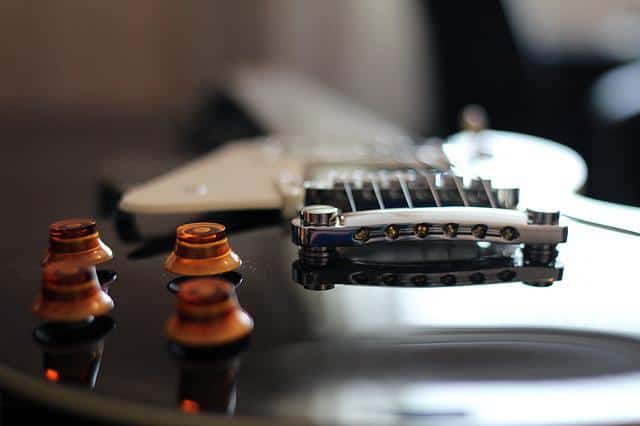When you want to sell a guitar it’s time to do some research. Not only will it help to ensure that you get a fair price but it will probably prompt you to learn more about the instrument yourself.
For example, decoding the serial number and finding out exactly when the instrument was made could be useful information for the buyer.
There are even people who do this and “flip” guitars for a profit to make a living!
Except when you are selling a rare instrument, you usually have to go with the flow of the market. Check the sale prices of similar instruments in the same condition at your favorite websites and then adjust your price according to how quickly you need to sell.
There are a few manufacturers’ instruments that you can usually count on to go up in value or at least keep steady with inflation.
Certain electric guitars from Gibson, Fender, PRS, and acoustics from Gibson, Taylor, and Martin are good long-term investments.
But if you are intent on selling now or in the near future the first thing you need to do is try to forget what you paid for your guitar.
No one cares what you paid and you will have to abide by market prices.
We are mainly going to focus on selling directly here since selling to a shop will limit your ability to set the price.
So what are the best sources to determine your guitar’s value?
Where to check for used guitar prices
Most people are familiar with the Blue Book pricing system that is popular for automobiles and there is actually a version for guitars too.
But this option costs money and it may not be as up-to-date as it should be.
So the classic way that a lot of people and shops find current market prices is by looking at completed listings on eBay to see what a model has recently sold for.
Although eBay offers a lot of “buy it now” options when a guitar is sold via auction sometimes people can go crazy in bidding wars and really overpay.
So again I’m not sure that this is the best method for pricing your used instrument.
Like it or not, Reverb.com is the hottest game in town for used gear right now and I personally think it’s the best source for pricing information.
They’ve really made an effort to provide pricing recommendations for specific models (sometimes grouped together by manufacturing date) and you can see recently sold prices with a free account.
So I think Reverb should be your first stop for common models. For less popular items you may have more luck on eBay though.
There is something to consider with these sites and that is that people are paying fees to sell on them.
So watching music gear for sale on forums, Craigslist, and our GearAficionado market can give an accurate and fair sale price if you don’t have to pay any fees.
Basically, if you aren’t losing a percentage of the sale cost, you can pass some of the savings on to the buyer to sell your item quicker and everybody wins.
Factors that can increase the price of your guitar
When setting your sale price there’s a lot to consider besides the basic manufacturer, model, or even production year.
The guitar’s condition is obviously important but you have to dig a little deeper sometimes.
Especially for Fenders, certain colors are added and removed from production (like FSR or store exclusives) so if you have a sought-after color that hasn’t been offered in a while you can probably get a little more money.
Of course, this extends to any type of instrument that is considered rare because you aren’t competing with a lot of other sellers.
Other factors that affect guitars include having the original case or gig bag or documentation that came with it. And if you are the original owner go ahead and say so in your “for sale” ad.
Factors that can decrease the price of your guitar
Regarding the condition of your instrument, you need to be honest with the buyer and yourself.
Don’t skimp on high-quality photos either. If there is only one out-of-focus picture of your instrument, a lot of people will just move on because they suspect that there are chips and scratches that you are trying to hide.
And if you have a popular model that a lot of other people are also selling, such as a MIM Strat, you will have to go with the market value.
Other pitfalls are missing or non-original parts such as tremolo arms, tuners, bridges, cases, the back-plate for the tremolo cavity, etc. And this usually includes modifications; even if you consider them to be upgrades, that doesn’t mean that someone else will.
Is it a good idea to list your guitar at a high price?
There are a couple of circumstances where you can safely list your guitar above what recent sales indicate it will sell for.
The first is when you don’t actually need to sell the guitar; you can take it or leave it.
You can list it for sale at a higher than the normal price at some place that doesn’t charge listing fees and just wait.
I see this with many different items on Amazon all the time. If it doesn’t sell, you didn’t lose any money so who cares?
The other situation is when you have something unique and there are no other sellers currently offering what you have.
If your guitar is special enough, you don’t have to worry about market prices because you are the market.
In this scenario, I include guitars that have been used by celebrities or used to record songs on famous albums.
Whether you believe that an instrument can have someone’s “mojo” or not, there have been a lot of guitars like this selling for unbelievable amounts of money recently.
And for both of these situations, you may receive lower offers from potential buyers and you can then bargain if you want.
Is it a good idea to list your guitar at a low price?
If you need money quickly or you are on a deadline such as moving to a new home then unfortunately you are at the mercy of the market.
Undercutting other sellers or at least matching them is your only real option. And if you have to take a loss, just think of the time you spent playing the guitar as renting it.
Best places to sell your guitar
Some websites charge fees to list your item so it’s best to avoid them if you want to list a guitar at a high price just to see if anyone is interested.
In their defense, they usually do offer high visibility because of the number of people who browse the popular websites.
Whether you want to offer to ship or sell locally, accepting trades/offers is up to you.
Just do your research first.
You can use Reverb’s pricing database without actually selling on their platform and then decide on a happy medium that will make the guitar an attractive deal for buyers and get you the compensation that you want.
However, here is an article I wrote about the best places to sell your music gear:

Hello there, my name is Ramiro and I’ve been playing guitar for almost 20 years. I’m obsessed with everything gear-related and I thought it might be worth sharing it. From guitars, pedals, amps, and synths to studio gear and production tips, I hope you find what I post here useful, and I’ll try my best to keep it entertaining also.





